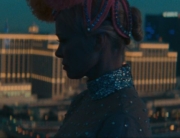Writer/director Nicholas Jarecki turns his debut feature into a competent, glossy-looking thriller that gussies up the familiar and articulately updates it to the new Gilded Age of hedge funds and heiresses apparent, but with uncomfortable sympathy for the man at the pinnacle of the one percent.
The rich guy here, Robert Miller (the ever debonair and charming Richard Gere), lives and deals in the luxurious cocoon of the best of Manhattan real estate, and negotiates business even as his family gathers to celebrate his 60th birthday. His beautiful wife and charity doyenne, Ellen (Susan Sarandon), mocks his drive to keep making more money, and, in hints of Madoff schadenfreude, their adult children are managers in his investment fund: their smart as a whip daughter Brooke (Brit Marling) and laid-back son Peter (Austin Lysy).
Miller’s Master of the Universe ego matches his lifestyle as he ditches his family party for a tryst with his pretty, demanding young French mistress Julie Côte (Laetitia Casta), whose art gallery he bankrolls. Other demands on him also escalate—from his wife for a $2 million check for an upcoming gala announcing their names on a hospital wing, his daughter’s inquiries over suspicious entries in the company ledgers, a Russian copper mine that’s corroding, and a stalling client (Vanity Fair editor-in-chief Graydon Carter makes a late appearance as a terrifically imperious mogul)—yet he impetuously decides to indulge the mistress for a late-night getaway out of town. Then everything crashes down around him, and he thinks he can keep wheeling and dealing his way out of tightening options in plot twists that are not completely credible.
The car crash with the young mistress seems to happen in an unknown, deserted stretch of highway in the outskirts of New York City, such that intense NYPD Detective Michael Bryer (Tim Roth) becomes as obsessed as any Law & Order investigator in bringing down the uptown rich and famous by constantly chipping away at Miller’s alibis. The detective is particularly interested in the surprising link of loyalty between Miller and a young African-American man from a tougher part of town, Jimmy Grant (Nate Parker), the son of his former limo driver. An almost incidental point is not only how the law enforcement establishment differentially treats the races and classes but that a possible violent crime will draw more legal attention than a large-scale white collar crime.
From there on, the editing and look of the film (cinematographer Yorick Le Saux also richly captured Italian luxury living in I Am Love in 2009) ostentatiously take over to cover over a plot that borrows from decades of other thrillers, though with some sharp dialogue of contemporary references to the financial maelstrom. The complications from an accidentally dead mistress progress much like in No Way Out (1987). A mistake on the Triborough Bridge, with a pointed update to the RFK Bridge, plays as an important turning point like in Bonfire of the Vanities (1990), and Miller’s increasingly desperate negotiations in a limo make David Cronenberg’s exaggerated Cosmopolis almost look realistic. As if he is like the victims of change in The Company Men (2010) or the bankers in last year’s Margin Call, Miller is seen as a well-meaning investor who just didn’t understand the complexities of today’s unscrupulous financial instruments. He lashes out at his fair weather friends when the money stops pouring in, unlike Michael Douglas’s Gordon Gekko in Wall Street’s personification of the “Greed is good” ethos of the 1980s and revisited in 2010. Yet his acts of fraud and deception are as cynically calculated as Douglas’s billionaire husband in A Perfect Murder (1987). A more original film could have been made about that Russian copper mine as to who conned this titan of finance and then thwarted his greed that was fueling everyone around him.
Though the women have vastly more opportunities now to cleverly provide twists in the story, the canny mother, daughter, and mistress coolly play these key roles in a manner that harks back to Edith Wharton’s view of an earlier Gilded Age, as seen in Martin Scorsese’s The Age of Innocence (1993). Without a doubt, a similarly average entertaining thriller could be told during the burst of the tulip bubble in 17th century Holland using these same tropes.







Leave A Comment